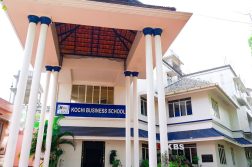A New Benchmark in Purpose-Driven Management Education
When the 2024–25 placement season drew to a close at many of India’s top B-schools, the headlines were no longer about crore-plus offers but about falling averages and unplaced students. This decline isn’t a sign that the MBA has lost its value; rather, it’s a clear signal that business education is struggling to keep pace with a fast-evolving global economy. The issue isn’t the degree itself, but the outdated curriculum, which many programmes still rely on. B-Schools that continue to teach yesterday’s toolkit are producing graduates ill-prepared for today’s challenges.
In contrast, institutions that embed analytics, AI literacy, and real-world industry immersion into the core of their programmes are proving that their graduates remain employable, even in tougher markets. Sri Venkateswara College of Computer Applications and Management (SVCCAM) in Coimbatore exemplifies this new paradigm.
Driven by its founding vision to nurture competent, ethical, and socially responsible leaders through value-based education and continuous innovation, SVCCAM has steadily built a reputation as a forward-looking B-school. The institution aspires to be a center of excellence in management education by integrating academic rigor with industry relevance and fostering global perspectives.
Through a deep-rooted emphasis on leadership, entrepreneurship, and sustainability, SVCCAM is shaping professionals equipped to lead organizations with purpose and agility, and to make meaningful contributions to business and society alike. In an era defined by uncertainty and disruption, this kind of future-facing education is not just relevant, perhaps it’s the most essential.
Translating Vision into Outcomes
Recognised as the leading Anna University–affiliated destination for MBA and MCA studies in Coimbatore, SVCCAM translates this vision into measurable outcomes. The placement cell designs intensive, recruiter‑approved training modules that turn classrooms into practice grounds for analytics, coding and domain‑specific software. A rolling syllabus‑review cycle ensures course content evolves in lockstep with market demand, giving graduates a competitive edge in the global job arena.
This industry responsiveness is anchored by a faculty roster that blends scholarly depth with practical know‑how. The majority of lecturers hold Ph.D. or M.Phil. degrees, and many bring prior experience from banking, IT, consulting and manufacturing. Their collective expertise spans analytics, finance, marketing, HR, operations, data science and software development. Regular participation in conferences, faculty‑development programmes and research collaborations keeps them abreast of emerging business and technology trends, while strong corporate linkages channel real‑world projects and guest sessions back into the classroom.
Delivering Results
SVCCAM’s commitment to industry-aligned learning is reflected in its robust placement outcomes. In recent years, the college has achieved a placement rate of around 95%, with top packages reaching up to ₹12 LPA and average salaries in the range of ₹7–8 LPA. The placement drive attracts a diverse mix of recruiters from sectors such as technology, FMCG, banking, and e-commerce. Key recruiters include TCS, Deloitte, Hindustan Unilever Limited, TVS Motors, ICICI Bank, Amazon, and Simplilearn, among others.
Internships play a crucial role in SVCCAM’s experiential learning model. MBA students take on roles in marketing, finance, HR, and operations with firms like Zoho, TVS Motors, and ICICI Bank. MCA students engage in technical projects focused on software development and data analytics with industry leaders such as TCS, HCL, and Wipro. These internships often serve as gateways to pre-placement offers, further strengthening the career prospects of SVCCAM graduates.
Shaping Well-Rounded Professionals
SVCCAM hosts various student-led clubs and associations that play a vital role in every student’s developmental journey. Functional Clubs such as Marketing, Finance, HR, and IT organize weekly activities to build domain expertise and practical skills. Literary, Cultural, and Sports Clubs provide platforms for creativity, self-expression, and team collaboration, contributing to a well-rounded personality. For MCA students, Tech Clubs offer opportunities to participate in coding contests, app development, and tech festivals, fostering innovation and technical proficiency.
SVCCAM also encourages participation in a range of competitions and events, including intercollegiate fests, national business plan contests, coding competitions, and hackathons. In-house events like “Management Day,” quizzes, debates, and simulation games allow students to apply academic knowledge in dynamic, real-world scenarios.
Leadership and personality development are integral to the SVCCAM experience. Students are actively involved in organizing college events, leading clubs, and participating in community outreach. Dedicated programs in leadership development, soft skills training, and value-added certificate courses help shape them into confident, ethical, and industry-ready professionals.
In the Days to Come

To conclude, Commander K. Velu, Founder & CEO of SVCCAM, shared insights into the institute’s future vision. He emphasized that key priorities include curriculum enhancement, forging international collaborations, and attaining higher national and global accreditations to elevate the institute’s reputation and attract top talent.
Additionally, he highlighted the commitment to embedding sustainability into campus operations and academic programs, promoting eco-friendly practices.




